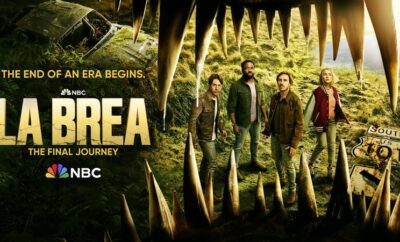Interviews
Hank Azaria & Nicholas Gonzalez – Bordertown
Q) What was it about the premise of the show in general and about your characters in particular, both of you, that turned you on and made you want to be part of the show?
Hank: I always wanted to work with the Family Guy producers because I really love the show, and this show seemed to have very similar sensibility, although it’s about different stuff. When I first heard about it a year or two ago, it seemed timely then, and now, I mean, happily or unhappily, it’s even more timely. So, it’s fun to have that. When comedy is really relevant to genuine concerns, it’s always interesting.
Nicholas: Even though we’re in very different places in the animation world and things, my reason is very much the same. I think you look at the top echelons of animation, whether it be TV or film, and Seth MacFarlane and Family Guy and those producers are just at the top, and that’s what you wish for. God, it would be great to have an animated series. Well, what would your top choice be? Well, I’d love to work with the guys at Family Guy. And that’s the thing that led you into this. This wasn’t like a twisting of an arm here, definitely not for me. But I think also, I agree that for me, it felt—on top of that, what really attracted me to this role was being able to make commentary in comedy and satire about things that do actually matter and things that are deciding our presidential election, funnily enough, things that seem like common sense, and yet there’s a global argument about them, and we get to tackle these issues every week. So, easy deal there.
Q) Hank, let me ask you about cultural sensitivity in the creation of this project. The fact that someone has an accent means that they speak more than one language. So, let’s talk a little bit about the cultural sensitivity and the nuances that the writers have for shaping this show.
Nicholas: I was honestly just thinking about this this morning. I think we’re in a climate now where cultural insensitivity is something that, I think, people that aren’t—you know, I think liberals throw out and then people that aren’t laugh about and make fun and think that we’re all being too sensitive. But I think that we were all being a little too racist for too long with things that are just, like, “It’s a joke, relax,” things that are explained away like that. But I think what’s nice is that we actually embrace a lot of those things and turn then on their head within the confines of this show, but it’s something that, I think, has gone on so long that it seemed like something that’s harmless, but now you’re looking at a top presidential candidate, who shall remain nameless, who’s using some of these and throwing it out, like, no big deal, come on, it’s just like we always used to talk and how we used to be. Well, that wasn’t working.
Hank: I agree. For too long, we were too casual about this kind of thing. What’s funny, though, this show reminded me when I first read it a lot of one of my favorite shows of all time, All in the Family. And as much as we can do more now on TV, like with cable, we can curse, there can be nudity, violence, crazy subject matter, really deep issues explored, you know, I don’t think that you could get away with Archie Bunker today because of the politically correct thing that Nick was referring to. What I think is cool and maybe the show is indicative of, although, look, like All in the Family, it mostly tries to be funny, first and foremost, is that we’re maybe returning back to a middle place where we can acknowledge that since racial sensitivity is really important to honor and understand and not be cavalier about, but also be able to talk. Maybe the one good thing about what certain candidates are saying is that it is opening the conversation. You know what I mean? It is, like, making it something we’re all talking about openly, which is not a bad thing.
Nicholas: Yes. Conversation is great. I think that’s exactly what this show puts forth, because yes, you’re going to be offended, and you should be offended. You should be offended by things that are going on around in your life all the time, so this is just another thing that you can actually learn from, so be offended and learn something.
Q) Hank, tell us, and Nicholas, tell us in your own words about your role, your character, who is Bud and, obviously, as a border patrol agent, Hank.
Hank: Yes, Bud is a border patrol agent. He’s not the brightest bulb in the box. Pretty simple guy, and he’s a pretty unhappy guy. Life has not really treated him as he hoped it would. He takes his job personally and seriously. He really wants to keep aliens out of the country, and he’s extremely upset by it. Lives next door to a guy who’s more successful than him, who happens to be Mexican American, and that really—he doesn’t like that at all, I think is an understatement.
Nicholas: And I play Ernesto Gonzalez. He’s in some ways been described as the heart of the show, although I think at the bottom of all these characters, whether acts are reprehensible or crazy stuff they get involved with, there’s still such a heart at the base and lessons learned as well between the characters. There’s this constant hate, but there’s also a lot of love between Bud and Ernesto. Ernesto’s his next door neighbor who has a successful landscaping business. He’s a good family man. He’s just a really fun, lovable guy that, I think, all the more fun and lovable he is, the more it rankles Bud. There’s even an episode at one point where Bud is a super fan of Ernesto’s. For as much as he doesn’t like him, it really turns out that he just wants to be like him so much. And then, J.C. Gonzalez, my nephew, who’s now come home from college, who, I think, represents a lot of the way people see the generation now coming out of college that’s without really a compass of where they’re headed. He’s such an annoyingly proselytizing liberal who just gets caught up in whatever protest is in mode at the time and very outspoken about it and sometimes signifying nothing.
Q) We know it’s very culturally sensitive, but it’s really the iGeneration. The generation’s going to pay attention. Could it be backwards? Could it be the fact that we already overcame at that age these barriers and it’s going to be funny, but we also are going to learn from the show and open up more to togetherness? What’s your opinion about that?
Nicholas: I think, well, do we not see it the same as the older generations? Yes. I can completely agree, but is there—are we a little bit better at hiding it because we know it’s not something that’s nice to be racist to your neighbor and we’re in a climate where people are highly criticized, even to the point of losing jobs and things on their own opinions about race? So, has it really changed? I don’t know. I think we’re better at keeping it close to the breast and only sharing it among close friends in a joke, to be honest.
Hank: I don’t know. I think that it’s a complicated thing, and that it’s something that the more, I think, it’s discussed, and the more that it’s just an open, on-the-table topic of conversation, the better off we all are. And the closer we get to people just being judged as individuals and not as color, race, accents. But here’s the good new, I think. Like it or not, whatever opinion you have, wherever you are on the spectrum of what we just discussed, it’s happening in our country.
Q) The characters are obviously in completely different realms, but wanted to get your feel on what kind of freedom you might have had developing these characters, because they’re not the normal, everyday characters you might be playing. Did you have any input or anything you saw twisted in maybe adding a couple of improvs to your characters that may have not been in the script?
Hank: Nicholas probably did more than I did, if he did. I really kind of came in—this thing was a pretty fully formed vision by the time I came on board, and I was really just there to give voice to Bud. I just really wanted to—I focused mostly on finding, literally, the right voice, something that would play comedically and also play the right emotional beats that needed to be played and just really make the vision of this thing that Mark Hentemann had come to life as best I can. And that was really a large job. I didn’t get in there and, “Shouldn’t we change this or change that?”
Nicholas: So, that’s what I was supposed to do.
Hank: Nicholas might have more.
Nicholas:I wish I had done that whole checklist you just talked about because we’d probably be in a lot better position right now. Oh, man. No, he’s right. I guess there was a little—he’s right. We came to this project, and the nice part is Mark had a very firm vision about what he saw and put people that were going to fit in there, but I think it’s also part of the job more than people realize. It’s not like we’re
work in this animated series. You’re pretty beholden to the lines. You say it as they’re supposed to be said, but sometimes you have a little fun or you make some suggestions, and they humor you and everyone laughs and you think it’s going to end up in the episode and then it doesn’t. So, you have a lot of fun with it, and sometimes we’ve been able to improv and find something that wasn’t there before. That way the job is constantly alive. But there’s a lot that just kind of has to fit into its own. If you do your work beforehand with finding where your character stands in all these different situations, then you can just fully flesh it out, which is what, like when Hank came to Bud just really brought a lot of life to it, and that’s your improv within the confines of the show.
Q) Just like The Simpsons and Family Guy, will you guys be pushing any boundaries?
Hank: I would say yes. I think The Simpsons, 27 years ago, pushed boundaries and then directly or indirectly or consciously or unconsciously opened the door for shows like Family Guy, South Park, and other great shows. And when I say this has a Family Guy sensibility, what I mean is that it will really go to like a whoa place, like, wow. Let’s put it this way, there are some lines I said as Bud that I was glad it wasn’t—it was just my voice and not my face associated with the line. I was, like, wow, this is quite something to say. And Family Guy goes there; so does South Park. And yes, the show, part of the point of the show is not—sometimes it’s just there for comedic shock value. A lot of times it’s there to make a point as well.
Q) Nick, this is kind of a departure from what you’re used to. Can you give me a little bit of an insight of why you chose this, to be part of an animated series?
Nicholas: I like money, for one thing. And it’s not like a windfall at this point of the show, but yes, that’s the main thing. I was telling one of the earlier interviewers is that’s kind of what actors want. There are very diverse markets available these days, whether it’s video games and performance capture and straight voiceover, book deals, like where you’re reading books, book narration. There’s something you always want to get into, and something like animation is a great job that works around your schedule, and it’s funny. You’re surrounded by brilliant people, and I get to work with people like Hank that aren’t only just trying to beat me on the poker table, but we finally get to work for the forces of good together. So, for me, it’s all a win-win. You don’t have to ask why I do something like this, because it’s around extremely creative people that are hilarious and happy to be a part of it and want to continue doing more.
Hank: I kind of look at Family Guy as being the cool kids, like the big kids’ table. Simpsons, we don’t get to push things as far, and I’m sometimes jealous of that. I’ve admired Seth for a long time and Mark, and you know, saw a way to jump in here that was really fun. It’s something I’ve done for years, primetime animation. I really, really enjoy it. So, why not try something a little different?
Q) How many episodes have been filmed, and how long did it take you guys to do your part of it?
Nick: Thirteen episodes, and it took somewhere around, all in with starting the script read-throughs to doing the last minute ADR touches and screenings and stuff, about two years.
Q) So, each of you took that long or just the whole thing took that long?
Nicholas: Yes, I mean, the whole thing. And of course, Hank and my character, Ernesto, are throughout all the episodes, so you know? Some we were able to come in and knock out really quick, but animation takes a long time.
Q) Can you guys talk about the process of finding the right voice and pitch for each of your characters? Was there a specific sound that you guys were aiming for?
Hank: It was hard, harder than usual to find this guy. We worked a lot, Mark Hentemann and I, to sort of figure out how he should sound. Mark had a very definite idea. We sort of opened it up. There was a day where I came in, literally dropped like a dozen voices I thought could work, and it ended up coming down between the voice that was in there and another voice. It’s actually a voice that’s based on a Simpsons writer, actually. But it was tricky getting this character, making him funny, silly, pathetic, but also believable with the proper level of anger, and then also sustainable. And also didn’t sound like anything I’ve done, because I’ve done so many voices on The Simpsons, I didn’t want to recreate anything, and sometimes he sounded sort of similar to Comic Book Guy. I had to rerecord some things that sounded too close to that. So, it was a little harder than usual for me, this one.
Q) I’ve heard a lot with the other guys before, so what was the funniest thing you have done so far with this new series, Bordertown?
Nicholas: I guess the most fun thing because of it has really been a lot of the publicity, you know, with Comic-Cons and those kinds of things with the cast, finally getting in a room with Hank Azaria and Alex Borstein, Missi Pyle, Judah Friedlander, for all of us to be together, because we’ve all been so spread out and have never even really been together for a table read. So, that’s been, honestly, the most fun for me has been hitting the road with those guys and getting to play to live audiences and talk to people.
Q) What we are going to see on the Bordertown is probably some kind of a reality between the north border, I mean with Mexico and the US in some way?
Nicholas: Oh, yes, it’s all pulled from real life. Some of it is satire, of course, taken to the absurd, but some of that absurd actually proves to be things that are actually happening now after the episode was written and shot. So, yes, regardless of whether it be absurd or the everyday violence on the border, all of it is represented in this show in its own way.
*CONFERENCE CALL*





You must be logged in to post a comment Login